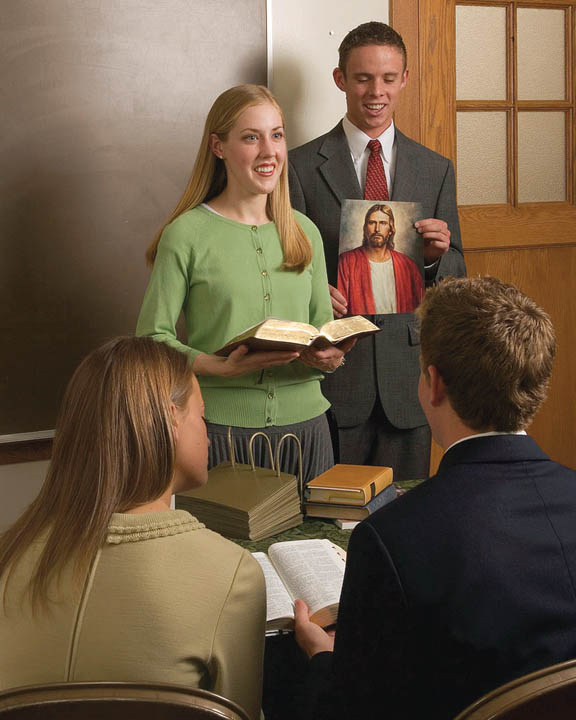Four-fold Mission of the Church
The three-fold mission of the Church was to perfect the saints, proclaim the gospel, and redeem the dead. Hence, the three-fold mission of the church began with self (Alma 60:23) and worked outwardly toward others and finally to deceased ancestors. Handbook 2, a guide for members of ward and stake councils, states that the original "three applications were part of one great work, stating: 'The Church of Jesus Christ of Latter-day Saints was organized by God to assist in His work to bring to pass the salvation and exaltation of His children' (see Moses 1:39)."
The Church of Jesus Christ now proclaims a four-fold mission—although it is not known by that name— having added caring for those in need as its fourth main purpose. It is now taught as "four aspects of God's work"—the work of salvation and exaltation.[1]
Contents
Living the gospel of Jesus Christ
An integral part of the Church's work is to help its members attain salvation through "coming unto Christ." Living the gospel of Jesus Christ includes learning and teaching the gospel at home and at church; making and keeping covenants with God, repenting daily, exercising faith in Christ, and providing spiritually and temporally for ourselves and our families. The various meetings of the Church including Sabbath services and others, such as General Conference, are aimed at teaching gospel doctrine (or the plan of salvation).[2]
Inviting all to receive the gospel
Members of the Church are also known for their missionary zeal. Many Latter-day Saints volunteer 18 months to two years, without pay, to their Church to share the gospel of Jesus Christ full-time in foreign lands or other areas away from home.
Members help new and returning Church members progress along the covenant path.
Uniting families for eternity
The Church of Jesus Christ of Latter-day Saints constructs numerous temples and practices in them holy ordinances as in ancient times. However, ordinances and practices relating to the Law of Moses are no longer practiced, as the Law of Moses was fulfilled by Christ.
The doctrine of the Church is that at death the physical body is discarded, and the spirit moves on to a place called the Spirit World. Spirits in the Spirit World have the same personality characteristics, desires, and freedom of choice as embodied, mortal beings. In the Spirit World, all have the opportunity to accept or reject the Savior Jesus Christ, and to accept or reject ordinances, such as baptism, that might be performed for them vicariously on earth. These ordinances are performed in Latter-day Saint temples and include Baptism for the Dead, the Temple endowment, and eternal marriage.
The purpose for constructing temples is "to provide ordinances necessary for the children of God to enable them to return to dwell with Him. Temple ordinances lead to the greatest blessings available through the Atonement of Jesus Christ. Everything in the Church—the meetings and activities, the missionary efforts, the lessons taught and the hymns—all lead to the work done in holy temples."[3]
Members are encouraged to discover their deceased ancestors and perform ordinances for them in the temple. Members are taught to go to the temple regularly to worship God and to perform ordinances for His children.
Care for Those in Need
Through its vast welfare and humanitarian aid programs as well as the personal service of its individual members, the Church of Jesus Christ is well-known for its outreach and help to those afflicted in any way, from temporary joblessness or illness to disasters that cause acute suffering.
Members of the Church are known for aiding one another through what is known as Ministering, in which members serve and minister to individuals, families, and communities.
